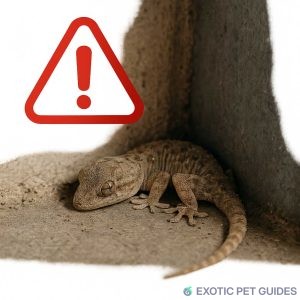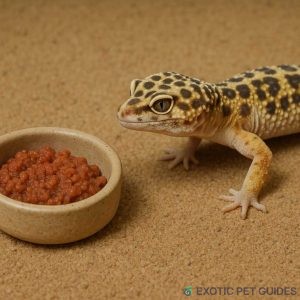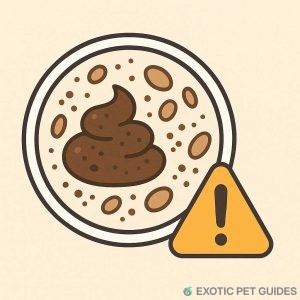🦎 Introduction
Geckos are quiet, low-maintenance pets—but that also makes it easy to miss early signs of illness. Many health problems develop slowly, and by the time symptoms are obvious, it may already be serious.
In this guide, you’ll learn the top 10 warning signs your leopard, crested, or other gecko might be sick—and what steps to take before it’s too late.

🚩 1. Not Eating for Several Days
It’s normal for geckos to skip a meal occasionally, but prolonged appetite loss (3–5+ days) is a red flag.
Possible causes:
- Temperature too low
- Stress
- Shedding
- Parasites or illness

🚩 2. Rapid Weight Loss or Thin Tail
Geckos store fat in their tails. A shrinking or bony tail usually indicates malnutrition, parasites, or chronic stress.

🚩 3. Lethargy and Weakness
If your gecko is sluggish, hiding constantly, or not responding to handling, something may be wrong.
Check:
- Tank temperature
- Recent shedding
- Feces consistency
- Calcium/vitamin intake
🚩 4. Runny or Smelly Poop
Healthy gecko poop should be solid and not overly wet. Foul smell or diarrhea is often a sign of internal parasites or infection.

🚩 5. Stuck Shed Around Toes, Tail, or Eyes
Leftover shed can cut off blood flow and lead to infection or digit loss.
Solution:
- Offer moist hide
- Use warm water + Q-tip to gently remove
- Boost humidity temporarily
🚩 6. Sunken Eyes or Dehydration
A dehydrated gecko may have wrinkled skin, dull eyes, and refuse food.
Fix:
- Always provide fresh water
- Mist enclosure (for species like crested geckos)
- Offer oral fluids (reptile electrolyte drops)
🚩 7. Limping or Trouble Walking
This may point to Metabolic Bone Disease (MBD) due to calcium or vitamin D3 deficiency. Often seen in under-supplemented juveniles.

🚩 8. Swollen Belly or Strange Lumps
Bloating, egg retention (in females), or impaction from swallowed substrate may cause swelling.
Don’t squeeze the belly. See a reptile vet immediately.
🚩 9. Clicking, Wheezing, or Breathing with Mouth Open
Respiratory infections are life-threatening in geckos. Common symptoms include:
- Open-mouth breathing
- Nose bubbles
- Clicking sounds

🚩 10. Visible Wounds or Skin Infections
Bites from cage mates, stuck shed, or enclosure injuries can lead to:
- Red, inflamed areas
- Oozing wounds
- Rotting skin (tail rot)
🧾 When to See a Reptile Vet
If your gecko shows any 2 or more of these symptoms, seek help from an exotics vet right away.
✅ Take photos
✅ Bring a fresh fecal sample
✅ Write down habitat temperature & diet details
🐾 Conclusion
Catching illness early gives your gecko the best chance of recovery. Monitor behavior, weight, and poop weekly—and always provide proper heat, diet, and clean housing. A healthy gecko is active, alert, and eats regularly.